
Wiesbaden is the capital of the German state of Hesse, and the second-largest Hessian city after Frankfurt am Main. With around 283,000 inhabitants, it is Germany's 24th-largest city. Wiesbaden forms a conurbation with a population of around 500,000 with the neighbouring city of Mainz. This conurbation is in turn embedded in the Rhine-Main Metropolitan Region—Germany's second-largest metropolitan region after Rhine-Ruhr—which also includes the nearby cities of Frankfurt am Main, Darmstadt, Offenbach am Main, and Hanau, and has a combined population exceeding 5.8 million.
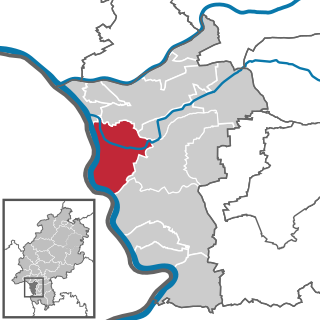
Trebur is a municipality in Groß-Gerau district in Hessen, Germany. It is 13 km southeast of Mainz, and 8 km south of Rüsselsheim.

Selters is a village in the district Limburg-Weilburg, Hesse, Germany. It is situated at the Taunus side of the river Lahn and belongs to the municipality Löhnberg. The village has a total population of 319.

The Taunus Railway is a double-track electrified railway line, which connects Frankfurt and Wiesbaden, Germany. It is 41.2 km long and follows the course of the Main on its north side, running quite close to it in some places. Its first stage was opened in September 1839 and is thus the oldest railway line in the German state of Hesse and one of the oldest in Germany. Today it is used by Regional-Express trains between Frankfurt and Wiesbaden and the trains of line S1 of the Rhine-Main S-Bahn between Frankfurt-Höchst and Wiesbaden. Between Frankfurt Hbf and Frankfurt-Höchst, they run on the line of the former Hessian Ludwig Railway.

The Hessisches Staatstheater Wiesbaden is a German theatre located in Wiesbaden, in the German state Hesse. The company produces operas, plays, ballets, musicals and concerts on four stages. Known also as the Staatstheater Wiesbaden or Theater Wiesbaden, its orchestra is the Hessisches Staatsorchester. The building was inaugurated in 1894.
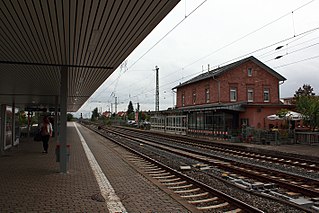
Kelsterbach station is the station of the town of Kelsterbach in the German state of Hesse on the Main Railway from Mainz to Frankfurt. The station is classified by Deutsche Bahn as a category 5 station.

Bad Soden (Taunus) station is the northern terminus of the Soden Railway in the German state of Hesse. It is also the northern terminus of line S3 of the Rhine-Main S-Bahn over the Limes Railway (Limesbahn).

Bensheim station is in the town of Bensheim on the Main-Neckar Railway, connecting Frankfurt and Heidelberg, in the German state of Hesse. The station is also the beginning and end of the single-track non-electrified Worms–Bensheim line. 114 trains stop at Bensheim station every day, of which about one-third are long-distance services. It is classified by Deutsche Bahn as a category 3 station. Bensheim station is protected as a cultural monument under the Hessian heritage legislation.
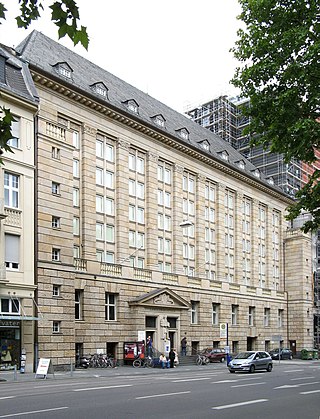
The Wiesbaden State Library, formerly the Nassau State Library and Hessian State Library, is one of the state libraries of Germany. It is funded by the State of Hesse and located in Wiesbaden. With collections currently comprising over one million books, it is one of Germany's largest research libraries. The major special collection is on the historical state of Nassau, in which the library has its roots. As of 1 January 2011 it became part of the RheinMain University of Applied Sciences. The library building is situated in the Rheinstraße) in central Wiesbaden.

Eschhofen station lies on the Lahn Valley Railway in the town of Limburg an der Lahn in the German state of Hesse. In addition, just east of the station, the Main-Lahn Railway (Main-Lahn-Bahn) branches off to Frankfurt. The station was opened in 1863. It is classified by Deutsche Bahn as a category 5 station.
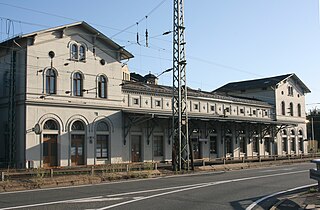
Rüdesheim (Rhein) station is in the town of Rüdesheim am Rhein in the German state of Hesse on the East Rhine Railway. It is on the western edge of the town, separated from the Rhine only by federal highway B 42. The entrance building is a double storey stucco building in a neoclassical style. It is now one of the cultural monuments listed in the UNESCO World Heritage Site of the Upper Middle Rhine Valley. The station is classified by Deutsche Bahn as a category 5 station.
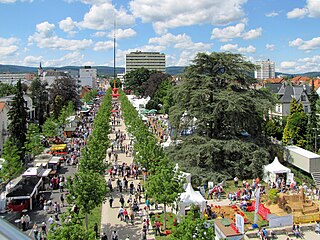
The Hessentag is an annual event, both fair and festival, organized by the German state of Hesse to represent the different regions of Hesse. The events are shown for a week to the visitors, with an emphasis on cultural displays and exhibitions. It is the oldest and largest state festival (Landesfest) in Germany.

Groß Gerau station is located approximately 500 metres north of the centre of the town of Groß-Gerau in the German state of Hesse on the Rhine-Main Railway, running from Wiesbaden and Mainz to Darmstadt and Aschaffenburg. A curve branches off near the station connecting to the nearby Groß-Gerau-Dornberg station on the Mannheim–Frankfurt railway. The station is classified by Deutsche Bahn as a category 5 station. The station name has no hyphen unlike the town it is in, following a Prussian government order of 1910, which applied because of Prussian finance for the line, even though the station was in the Grand Duchy of Hesse.
The Hessian Bibliography is a German regional bibliography. Its aim is to completely capture all the literature connected with the geography, history and culture of the German federal state of Hesse from the year 1974. It is based on the holdings of the copyright libraries at Kassel, Fulda, Frankfurt, Wiesbaden and Darmstadt.

The Sababurg, first called the Zappenburg, then Zapfenburg and today, after the Brothers Grimm fairy tale Sleeping Beauty Castle, is the ruin of a hill castle in the legendary Reinhardswald, a forested upland that runs through the North Hessian county of Kassel. Sababurg is also the name of a district of the town of Hofgeismar in which the castle is found.

Claus Friedrich Wisser was a German businessman and philanthropist, a patron of music and the arts. He was head of the service company Wisag which he founded, and was chairman of its supervisory board since 2011, and honorary chairman of that board from 2022.

Count Karl von Schlitz, in full: Karl Heinrich Wilhelm Hermann Ferdinand von Schlitz, genannt von Görtz was a German politician and Standesherr in the Grand Duchy of Hesse.

The Hessian Central State Archives, Wiesbaden is a department of the Hessian State Archives and is located in Wiesbaden, the capital of the German state of Hesse. It serves alongside the Hessian State Archives, Darmstadt and the Hessian State Archives, Marburg as the main regional archives for Hesse and additionally functions as the central archives for the state government and ministries, as well as other institutions with nationwide jurisdiction.

Boris Rhein is a German lawyer and politician of the Christian Democratic Union (CDU) who has been serving as Minister-President of Hesse since 2022. He has been active in the politics of Hesse since the late 1990s. After being elected to the Landtag of Hesse in 1999, he served as the state's Minister for the Interior from 2010 until 2014 and as the Minister for Science and Art from 2014 to 2019. On 31 May 2022, he was elected to succeed Volker Bouffier as the Minister-President of Hesse. He led the CDU to a victory in the 2023 Hessian state election.























